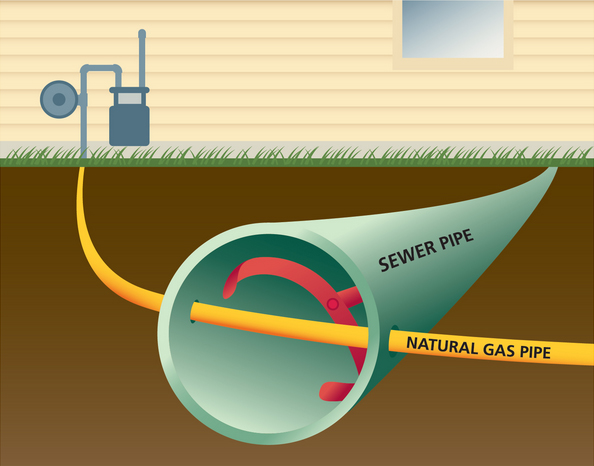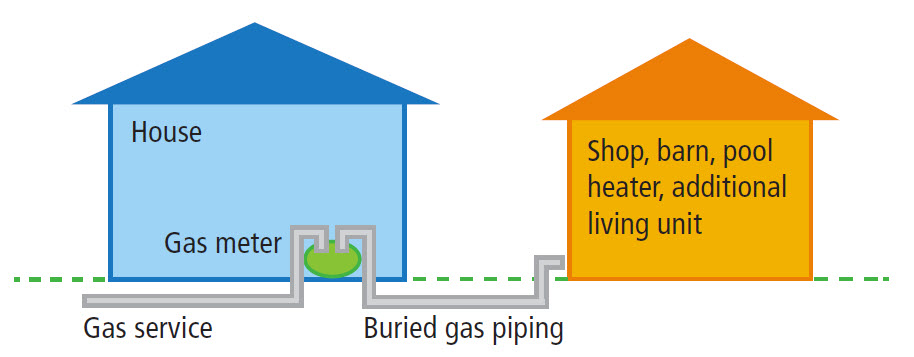Natural Gas Safety
Potential dangers of natural gas
Natural gas produces heat, carbon dioxide (CO), and water vapor under proper operating conditions and can be dangerous if handled improperly. Review our indoor and outdoor natural gas safety tips to recognize signs of trouble and understand steps to ensure your safety.
Visit our Call 811 before you dig page for details on staying safe while digging in your yard.
- Evacuate: Move everyone upwind – away from the area.
- Avoid sparks: Don’t use anything that could cause a spark, like flashlights or lighters.
- Call for help: From a safe distance, call 911 and then Avista at (800) 227-9187.
- Don’t repair: Never try to fix a natural gas line yourself or restrict the gas flow. Wait for professionals.
- Stay away: Keep away from the area until emergency personnel indicate it's safe to return.
Watch a video: Smell gas? Get out!
Watch a video: Outdoor Gas Leaks
Natural gas is colorless, odorless, and lighter than air. It becomes combustible when mixed with air and exposed to an ignition source. To help detect leaks, Avista adds Mercaptan, a sulfur-like, rotten egg smell, to our natural gas. Look for these signs:
- Smell rotten eggs
- Hear hissing or roaring
- See bubbles or blowing dirt?
Watch for these signs
- Blowing or hissing sounds
- Dust blowing from a hole in the ground
- Continuous bubbling in wet or flooded areas
- Dead or discolored vegetation in an otherwise green area
- Pilot lights that won't light but still emit gas
You can also install a natural gas detector.
A natural gas detector is not a substitute for calling 911 or Avista. If you suspect a natural gas leak, call 911 and then Avista at (800) 227-9187 immediately.
Natural gas detectors monitor natural gas levels and alert you to danger if gas levels become unsafe. An early warning can give you time to leave the area and call for help before the situation becomes more serious.
- Choose UL-listed models for safety and reliability.
- Follow the manufacturer’s instructions for placement and maintenance.
- Test monthly and replace batteries as needed.
- Secure appliances: Anchor your natural gas water heater to a wall
- Store safely: Keep flammable materials away from natural gas appliances
- Clear areas: Keep combustibles and other materials away from the area around natural gas appliances
- Child safety: Teach children to stay away from natural gas appliances
- Clean appliances: Keep ranges and ovens clean to prevent grease fires
- Proper use: Never use the oven or range to heat a room
- Avoid damage: Don't let children swing from gas pipes
Carbon monoxide (CO) is a colorless, odorless, toxic gas produced when fuel burns without enough oxygen. It can accumulate unnoticed, causing illness or even death.
Detection and response:
- Symptoms: Headache, dizziness, fatigue, nausea, confusion, blurry vision, chest pain, shortness of breath, flushed skin.
- Immediate Actions:
1. Evacuate: Get everyone to fresh air immediately.
2. Call 911: Then call Avista at (800) 227-9187. Do not reenter until it's safe.
3. Seek medical attention: Inform medical staff about suspected CO poisoning.
Common sources of carbon monoxide
- Blocked vents or chimney
- Fireplace
- Stove
- Vehicle
- Gas barbecue
- Portable generator
- Furnace
- Water heater
- Dryer
Preventing carbon monoxide poisoning
- Annual maintenance: Have heating systems, water heaters, and other fuel-burning appliances serviced by a qualified technician.
- Ventilation: Ensure appliances and heating equipment have adequate ventilation.
- Never use outdoor equipment indoors: Don’t use grills, generators, or gas-powered tools inside your home, garage, or basement.
Install a CO detector.
CO detectors monitor CO levels and alert you to danger. Buy UL-listed models and follow the manufacturer's instructions.
A carbon monoxide detector is not a substitute for calling 911 or Avista. If you suspect a CO leak, call 911 and then Avista at (800) 227-9187 immediately.
Visit the Carbon Monoxide Safety page for more information about CO and installing a CO detector.
Watch a video: Signs of carbon monoxide poisoning
Know about shutoff valves
- Modern natural gas appliances: Most new natural gas appliances, except for water heaters, come equipped with electronic ignition and automatic shutoff valves. These features prevent the main burner from activating if the pilot light is not lit.
- Older natural gas appliances: Older appliances and most gas water heaters may have pilot lights that burn continuously and might not include automatic shutoff valves.
What to do If the pilot light goes out
Rest assured; newer appliances will safely shut off automatically.
- If the appliance was recently working and you’re unsure why it stopped. Call us at (800) 227-9187. Depending on the circumstances, we may be able to relight the pilot light. If safe to do so, we'll attempt to relight it. If we are unable to do so, it will be necessary for you to contact a third-party contractor. Any costs associated with third-party services will be your responsibility.
- If the pilot light was previously turned off for the season or because of a move.
- In Oregon: Avista performs seasonal relights. Schedule a time for us to visit and relight your pilot. Call us at (800) 227-9187.
- In Washington and Idaho: Avista does not perform seasonal relights. Find a contractor near you to arrange for a field visit by a certified professional.
Note: Avista recommends that you obtain at least 3 bids from qualified service personnel.
You may encounter a gas line that was inadvertently bored through a sewer line. If you're cleaning out a sewer line with a rooter device, look for these signs:
- Bubbles rising through standing water or toilet bowl
- Strong “rotten egg” odor of natural gas
- Dirt blowing from a hole in the ground
- Hissing or whistling noise
- Dead vegetation in an otherwise green area
Watch a video: Outdoor Gas Leaks
If you see the signs above, act quickly:
- Evacuate: Get everyone out immediately and leave doors open.
- Avoid sparks: Don’t use anything that could cause a spark, like flashlights or lighters.
- Call for help: From a safe distance, call 911 and then Avista at (800) 227-9187.

Natural gas is one of the safest and most reliable fuels available. However, regular maintenance is essential.
- Meter Testing: Each meter is factory-tested. Avista randomly tests about 4,000 meters annually. If your meter is selected, you'll be notified in advance as your service will be temporarily disconnected. An Avista representative will check and relight your appliances afterward. An adult (18+) must be present.
- Safety Inspections: Avista conducts several annual safety inspections. These typically don't require home access. If a meter needs replacement, we'll contact you to schedule a convenient time. Do not attempt to relight your natural gas equipment yourself.
Visit our natural gas safety inspections page for more details.
Avista employees and authorized contractors carry photo identification and should always identify themselves upon request.
An EFV restricts the flow of natural gas if an underground pipe is punctured or severed. However, it doesn't completely shut off the flow. Always click or call 811 before digging to mark underground utility lines.
Important information about EFVs:
- Limitations: EFVs don't protect against appliance malfunctions, small leaks, or meter leaks.
- Suitability: Not suitable for all applications.
- Natural disasters: May not protect against earthquake or flood damage.
Installation:
- Installed underground on the service pipeline between the natural gas main and the Avista meter.
- EFVs have been installed on most new and replaced services since 2008. Existing customers can request an EFV at their expense. Costs vary, and estimates are provided case-by-case.
Request an EFV:
- Call (800) 227-9187 or email ask@myavista.com to check if you have an EFV or to request installation.
If you have buried natural gas piping between your meter and equipment, note the following:
- Responsibility: Homeowners are responsible for piping between the meter and equipment.
- Additional piping: Periodic inspections are recommended for additional underground piping (to a barn or shop).
- Inspections and repairs: Local contractors can inspect, and repair buried piping. Unsafe conditions should be addressed immediately.
- Hiring a contractor: Ensure all work complies with state and local codes. Locate lines in advance and hand-dig when excavating.
For concerns or repairs, contact a licensed plumber or heating dealer.

- Clear accumulated ice and snow: Regularly remove ice and snow from the meter and ensure all appliance exhaust vents on the side of your home or business are free from obstructions.
- Maintain gutters and downspouts: Clean and repair any leaky seams to prevent melting snow and ice from dripping onto the meter.

